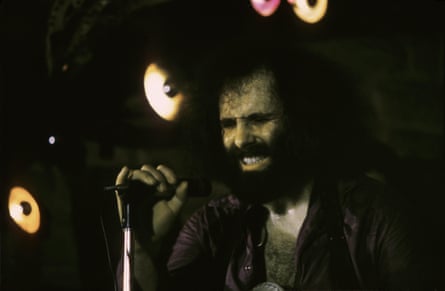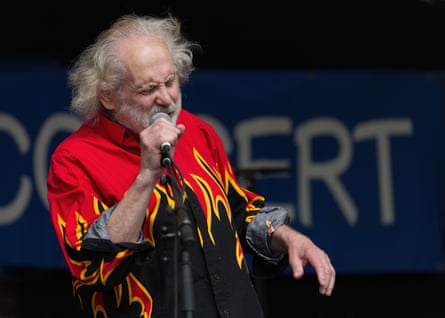Pete Brown’s camp invited me to the studio in April for what was likely to be his last ever record, due to health issues. He was obviously not well and at times had to fumble for words, something he never used to do. But Pete, being a man of words, was as articulate and frank as ever and under no illusions about his condition. Written prior to his death last week aged 82, here is the final interview with a hero of British counterculture.
It’s a cloudy afternoon in Eastborne’s Echo Zoo recording studio, and Pete Brown is all too aware these sessions could be his last. “I’m 82 and trying to survive cancer,” says the singer, beat poet, Cream lyricist, and collaborator over 48 years with bass guitarist Jack Bruce. “I’m trying to finish off probably my last record – which we’ve had a great time doing.”
The bass guitar of Malcolm Bruce – Jack’s son – is being overdubbed to Brown singing Shadow Club, the title track of his new album, slated for an October release. “There’s a bit of Jack Bruce there,” jokes Malcolm mid-riff. “Maybe we should replace that!” Brown sits on the sofa listening intently. “It’s the first time I’ve ever done a record with a proper budget, and with two great producers, so it’s a new departure for me,” he says.
Shadow Club’s after-hours vibe is a nostalgic tribute to the sweaty clubs and their artists during the British R&B boom that Brown came from in the mid-1960s. “I’ve always been interested in ghosts,” Brown says, “especially musical ghosts, and also by certain presences such as [keyboardist and bandleader] Graham Bond and [blues saxophonist] Dick Heckstall-Smith and people like that. They were very important in my life because they were bigger than life.”
Brown was already a well-established jazz poet in the early 60s backed by the top musicians in the British jazz scene, as well as the nascent blues and R&B circuits, before becoming a lyricist and singer. He held down a jazz poetry residency at Soho’s now-legendary Marquee Club, fronted the Pete Brown Poetry Band with guitarist John McLaughlin (later a key Miles Davis collaborator) and toured with Bond’s R&B outfit the Graham Bond Organisation. Then in 1965, Ginger Baker, another Graham Bond Organisation player, invited Brown to help finish the first Cream single, Wrapping Paper, with him and Bruce. Chemistry was immediate: Brown and Bruce formed a writing partnership that blossomed through the Cream years and beyond.

Brown wrote lyrics for Cream classics such as Sunshine of Your Love, I Feel Free and Dance the Night Away, a song inspired by Brown’s move to sobriety in 1967. “I had some very bad experiences with drugs and alcohol,” Brown says, describing a harrowing post-gig incident: “I had just done too much of everything and I became paralysed for a couple of hours. I thought I was dying. I had visions of my brain coming out of my ears and nose like mince meat and things and that. I realised that my body was trying to tell me something and more or less got straight overnight.”
The experience had a lot of nasty after-effects. “I had a lot of shakes, panic attacks and claustrophobia,” Brown remembers. “I couldn’t go on the tube for years. Getting more involved in music was very healing for me – I don’t know what I would have done without it.” The experience also left behind another Cream classic, White Room, the meaning of which – it begins “in the white room with black curtains near the station / Black roof country, no gold pavements, tired starlings” – has been fervently debated. “I had the actual freakout in the actual white room,” Brown clarifies, saying he returned to the room to write the song, as “a sort of woodshedding post-drug experience”.
“I’ve known Pete my whole life,” reflects Malcolm Bruce, whose mother Janet Godfrey also co-wrote Sleepy Time Time and Sweet Wine on Cream’s debut, Fresh Cream. “When I was very young he would be at the house all the time.”
“I was in awe of Jack,” remembers Brown. Cream split up in 1968 and the Bruce-Brown partnership continued, but not without the occasional challenges. “Sometimes we had to have a rest from each other – two very big personalities in the same room sometimes wasn’t good, plus his addictions got in the way.” Nevertheless, the partnership endured on every Jack Bruce solo release (except the instrumental second album Things We Like), while Brown fronted a series of other groups, produced records by some of his contemporaries such as Heckstall-Smith and Peter Green, and eventually wrote a memoir, 2010’s White Rooms and Imaginary Westerns. The Brown-Bruce partnership went on pause after another falling out following Bruce’s 2003 release More Jack Than God, but Bruce, suffering from liver disease, called a truce and called up Brown to collaborate on what was to be his final release, 2014’s Silver Rails. “Jack told me he wanted it to be ‘an old man’s record’,” Brown remembers. “I was very proud of it – it was my farewell to him.”
The family connection endures with Malcolm, who became Brown’s guitar player for gigs about 20 years ago, leading to occasional songwriting collaborations. “We’ve naturally gravitated to each other,” says Brown, who is planning to co-write material with Malcolm for the latter’s next album, “as long as I can stay alive for a reasonable amount of time”.
The seeds of Shadow Club were sown when Brown moved to Hastings from London after best friend and collaborator Phil Ryan died in 2016. “I was devastated when Phil died and didn’t think I would ever do another record,” says Brown. Shortly afterwards he met John Donaldson, producer, musical director and piano player on Shadow Club. “I started to learn the piano so I could write my own music and I asked John if he’d give me lessons,” Brown says. This led to some gigs and some writing. “There was a proper chemistry which I was amazed to discover this late in my life.”
The Eastbourne studio is a drumstick’s throw from the Grand Hotel, which gave the title and cover to Procul Harum’s 1973 album. Like Cream, Procul Harum were also a band with their own lyricist – Keith Reid, who Brown replaced for their 2017 album Novum, and who died in March. Bruce himself died in 2014, and Shadow Club’s title track names a roster of colleagues from his years in clubs such as the Marquee and the Flamingo. It feels as if he is taking stock of his life.
“Well, I can’t avoid the age that I am,” Brown replies. “Some of it is a reappraisal; trying to determine where you are and where to go. But some of it goes off on quite a strange path. It’s sort of about confusion, really; and about musical influences and things you know and how they stay with you. It’s also very varied – you’ve got a cat song, a dog song, three songs which are the kind of tribute songs, and a daft song that’s very British called Whodunnit. My mother-in-law, who had serious dementia, was staying with us for two years. She would watch reruns of Poirot, so I got to know all those British crime cliches. I put them in a song and made them even more silly.”

Whodunnit is sung with Arthur Brown, of “Crazy World of” and Fire fame. Though the two Browns only collaborated for the first time on Pete’s album Road of Cobras in 2010, their friendship runs deep – in 1969, when Arthur’s band dissolved in the middle of an American tour, he came back to London, homeless and penniless and moved in with Pete for a few months. “I love Arthur and I’ve got an awful lot of time for him,” Brown says. “He’s a very talented man – very funny and very human, one of the great British voices.”
Other guests include Joe Bonamassa – a fan of 60s British blues with whom Brown collaborated on Bonamassa’s 2020 release Royal Tea – plus Bernie Marsden, formerly of Whitesnake; Mississippi blues veteran Bobby Rush; and songwriter and producer Carla Olson, who all recorded remotely. Eric Clapton lends some guitar on the title track. “Eric sits behind an impregnable fence,” says Brown. “We communicated through his management. Originally Eric wasn’t going to do it because he was pretty busy, but when he found out I wasn’t very well, he changed his mind, so that was great.”
I can’t help wondering if his diagnosis has coloured the record at all, but Brown has always matched poetry with pragmatism. “I knew I had various forms of cancer for quite a while,” he says. “I’ve had a number of operations, but now I’m incurable, although they can delay the fatal day with various treatments. But I’ve always been trying to take stock of what’s going on and where I’m at – especially in recent years.”
It’s the end of the day and the recording sessions have wound down around us. Has making this album been cathartic? “I definitely think so,” Brown replies. “I don’t know what I would have done with myself over this period. It gives you a focus and you can see a goal ahead.”
His next plans are to finish off a musical and a book of poetry. “Sometimes you can generate reasonable energy, other times you just can’t and you have to get through it,” is his assessment of the road he has left. “If the goal is still there and there are still more things to achieve, then it’s worth trying to preserve yourself as long as possible in order to try to do them.”
Stay connected with us on social media platform for instant update click here to join our Twitter, & Facebook
We are now on Telegram. Click here to join our channel (@TechiUpdate) and stay updated with the latest Technology headlines.
For all the latest Music News Click Here
